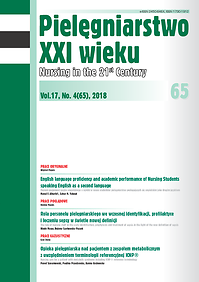Stress level and health locus of control in parents of hospitalized newborns - preliminary report
DOI:
https://doi.org/10.2478/pielxxiw-2018-0036Keywords:
stress, health, parents, newborn, hospitalizationAbstract
STRESS LEVEL AND HEALTH LOCUS OF CONTROL IN PARENTS OF HOSPITALIZED NEWBORNS - PRELIMINARY REPORT
Aim. The study was to assess the level of stress and the health locus of control in parents of hospitalized newborns.
Material and methods. The study covered a group of 150 parents of 126 newborns who were hospitalized in the Neonatal Pathology Ward at the University Children’s Hospital in Lublin. The diagnostic survey method was applied with the use of an original questionnaire as well as some standardized tools: Perceived Stress Scale (PSS-10) and Multidimensional Health Locus of Control Scale (MHLC – version B).
Results. In more than a half of the subjects (54.0%), a high level of stress was observed. Every fourth (26.1%) parent was characterized by an average level of stress and nearly every fifth (19.3%) by a low level of stress. The highest indicator was characterized by the domain of the internal health control locus. Every fifth parent represented an undifferentiated type - weak or magnifying the impact of others (22.0% and 20.0% respectively). The smallest group of parents (5.3%) belonged to the externally-oriented, strong type.
Conclusions. The parents of hospitalized newborns are characterized mainly by high and average levels of stress and low level of severity of health control location within each of its domains. The highest indicator of internal locus control and the influence of others are characterized by parents with low and average levels of stress. The dominant type of locus of health control that characterizes parents is the undifferentiated type – weak and magnifying the impact of others.
References
1. Aftyka A, Humeniuk B, Rybojad B, Rzońca P. Style radzenia sobie ze stresem u rodziców dzieci hospitalizowanych w oddziale intensywnej terapii noworodka. [Styles of doping with stress in parents of children hospitalized in neonatal intensive care unit]. Hyg. Publ. Health. 2015; 50 (2): 395-400.
2. Biskupska M, Konieczna M. Noworodek i jego rodzice w obliczu choroby i śmierci. [The infant and his parents in the face of illness and death]. Now. Lek. 2013; 82 (2): 142-149.
3. Kopeć A, Aftyka A, Humeniuk E, i wsp. Hospitalizacja dziecka w oddziale intensywnej terapii noworodka – doświadczenia rodziców. [Hospitalization of a child in the neonatal intensive care - parents’ experiences]. Curr. Probl. 2016; 17 (1): 24-30.
4. Heidari H, Hasanpour M, Fooladi M. Stress Management among parents of neonates hospitalized in NICU: a qualitative study. Journal of Caring Sciences. 2017; 6 (1): 29-38.
5. Jurczak A, Hop I, Wiedre-Huszla S, et al. The level of stress experienced by parents of infants hospitalized in a neonatal intensive care unit. JPHNMR. 2015; 1: 32-38.
6. Krywda-Rybska D, Zdun-Ryżewska A, Zach E. Stres psychologiczny i czynniki na niego wpływające u opiekuna dziecka krótkotrwale hospitalizowanego. [Psychological stress and its causes for caregives of children hospitalized for short time]. Pediatr. Med. Rodz. 2012; 8 (3): 268-271.
7. Palma EI, Von Wussow FK, Morales IB, et al. Stress in parents of newborns hospitalized in a neonatal intensive care unit. Rev. Chil. Pediatr. 2017; 88 (3): 332-339.
8. Jopek A, Gadzinowska-Szczucińska J, Szczapa T. Ocena percepcji stresu odczuwanego przez rodziców dzieci hospitalizowanych w oddziale intensywnej terapii noworodka. [Evaluation of stress responses in parents of newborns hospitalized in the intensive care unit.]. Gin. Pol. 2009; 80: 367-373.
9. Rozalska-Walaszek I, Aftyka A, Wróbel A, Karakuła–Juchnowicz H. Stres, jego skutki i emocje przeżywane przez rodziców dzieci hospitalizowanych w oddziale intensywnej terapii noworodka. [Stress, its efects and emotions experienced by parents of children hospitalized in neonatal intensive care unit]. Curr. Probl. Psychiatry. 2015; 16 (2): 81-87.
10. Juczyński Z. Narzędzia pomiaru w promocji i psychologii zdrowia. Warszawa: Pracownia Testów Psychologicznych; 2012, s. 81-88
11. Juczyński Z, Ogińska-Bulik N. Narzędzia pomiaru stresu i radzenia sobie ze stresem. Warszawa: Pracownia Testów Psychologicznych; 2012, s. 11-22.
Published
Issue
Section
License
Copyright (c) 2018 Authors

This work is licensed under a Creative Commons Attribution-NonCommercial-NoDerivatives 3.0 Unported License.




